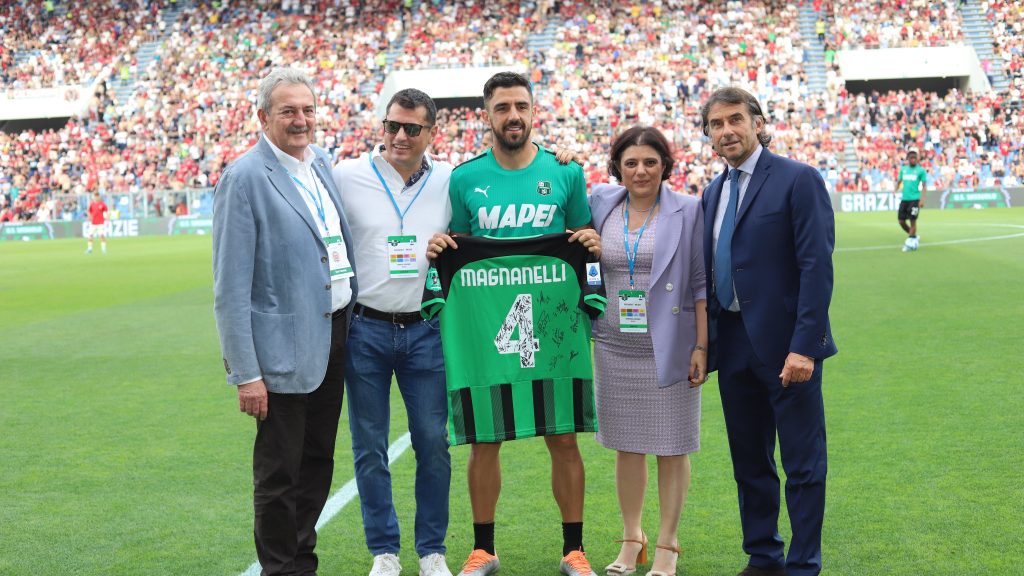Yesterday Sassuolo-Milan was Francesco Magnanelli’s last match of the career. After 520 games in the black and green jersey over the course of 17 sporting seasons with a path that took him and US Sassuolo from the Serie C2 championship to the Europa League, the captain bid farewell.

To celebrate and honour this fantastic and legendary adventure in neroverde, we offer you an excerpt from the interview we conducted with him a couple of years ago for Realtà Mapei on the subject of the approximately 70 field tests carried out with the staff of the Mapei Sport Research Centre.
«In these years together we have done a tremendous amount of work. The world of football is always evolving, season after season we have gone from a more technical game to one that is decidedly more physical, in this sense the assessments that Mapei Sport offers us represent a fundamental support in order to have a clear idea of the state of health and general condition of the team as well as the individual player. The information from the tests is decisive for avoiding injuries, making up for shortcomings and solving problems» began Francesco Magnanelli.
«I have seen the centre and its staff grow, professionalism and competence are not in question. Over the years I have established a good relationship with those who work there. When we went to Serie A, on his birthday, I immediately called Dr Squinzi: he was moved. He was a wonderful person and his employees are no different. We are not robots, we also need a human relationship, the staff at Mapei Sport know this and are very helpful. I will never forget the help he gave me following the injuries I suffered. The support was total during the recovery process, thanks to frequent checks we identified the right moment to return to the field. It often happens that you feel ok, but you’re not ready yet. Data in hand keep you in check when you kick out of a hurry, so as to avoid relapses. Only when the feelings are supported by the results of the tests is it time to get back on the pitch» the midfielder continues.
The Mapei tests sometimes feel like torture for the athletes. «Receiving electric shocks on your legs, at 8 o’clock in the morning, maybe in the middle of winter (he is referring to the neuromuscular function tests during changes of direction, ed), is a bit annoying, but this too is necessary and part of our work. Generally I like to get under the clutches of Ermanno and the other men from Mapei Sport because I’m curious and I know that, although it will cost me effort, it is functional for my performance. They make me sweat a lot, but this allows us to see where I am at. My favourite test? The HIT. It works on changes of direction, not at maximum heart rate, and measures lactate, ph and other values that are very useful for assessing physical condition. The results are then compared and cross-referenced with the ‘outcomes’ of the blood test performed at the same time, which is useful to check the state of metabolic efficiency and muscle fatigue».
His competitive longevity is also thanks to the staff who have been following him for years. «Certainly Mapei Sport has been important for my growth – he confirms. – A professional at the highest level must strive for continuous improvement, aiming for perfection. The medical and scientific tools, the data, the statistics that are provided to us by the trainers are decisive for improving both day by day and in the long term. The staff at the Varese centre have monitored my progress, giving me countless tips to correct flaws and improve strengths».
A lifetime seems to have passed since his first test. This is confirmed by Ermanno Rampinini, operations director and head of the Human Performance Lab at Mapei Sport: «New scientific knowledge allows us to be increasingly accurate and precise in our evaluations, and technological support allows us to carry out evaluations that were unthinkable in the past. Such as the change of direction test, which once did not exist and now allows us to measure in a simple and effective way the ability of players to limit the fatigue induced by a football-specific exercise and, with this information, the staff can optimise the athletic preparation of individual athletes at different times of the year. Another good example concerns GPS. Until a few years ago, it was only used by all of us in the car to find our way around, but today there are high-frequency devices that allow us to analyse activity in detail during training and matches. In addition to the technicians’ eye, we have more and more numbers at our disposal which, if interpreted correctly, are a significant help for coaches and trainers» he says.
«The world of sport is constantly changing – adds the U.S. Sassuolo captain for his part. – It’s not only the technical-tactical part that counts, but also the physical part. Training used to be longer, today we work more on intensity. On a smaller scale we tend to reproduce match situations. You try to optimise the time as much as possible, maybe you work just one hour but at a very high intensity. That’s why you have to be monitored. Mapei Sport assures me and my teammates that we are going in the right direction».